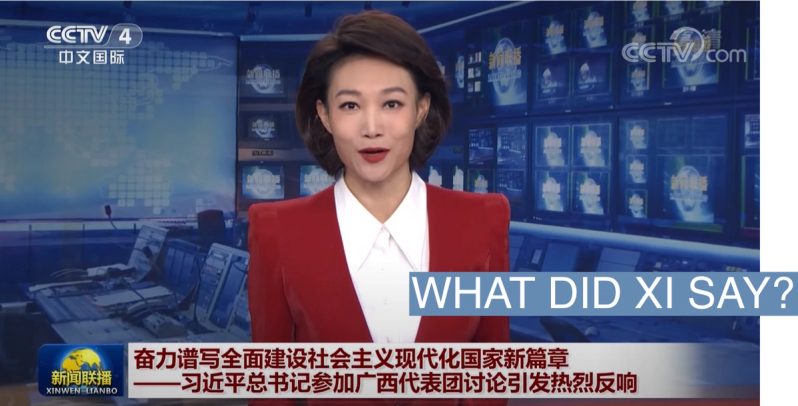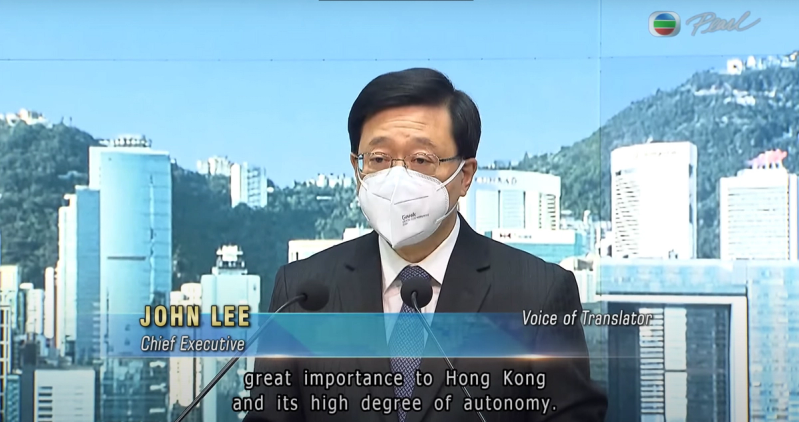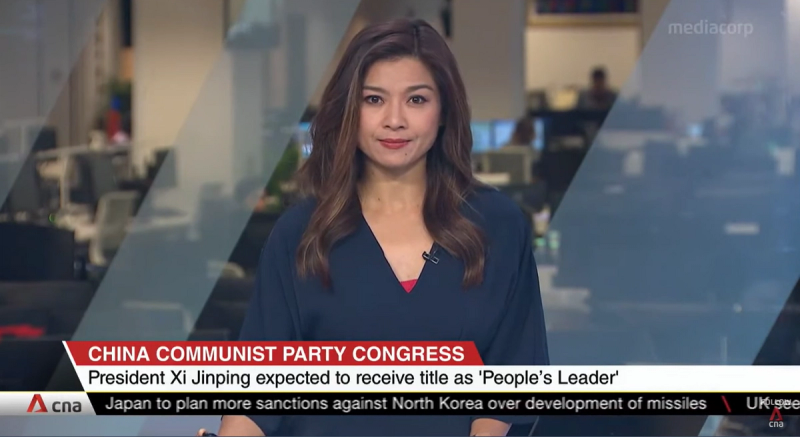The News
The Chinese Communist Party on Wednesday wrapped up day four of its week-long congress — the secretive, twice-a-decade meeting where Xi Jinping is expected to secure an unprecedented third term as the country’s leader.
What happens behind the congress’s closed doors is tightly-controlled by the party, but Semafor reviewed how Tuesday evening’s primetime news broadcasts in China, Singapore, Hong Kong, and Taiwan covered the meeting.

Know More
Chinese state media has relentlessly praised Xi Jinping over the course of the Communist Party congress this week, such as with a series of packages highlighting his efforts to build a harmonious China alongside the country’s 55 ethnic minority groups.
In its first package on Tuesday evening, “Xinwen Lianbo” — Chinese state broadcaster CCTV’s primetime news show — recapped Xi’s meeting with a delegation from Guangxi, one of China’s most ethnically-diverse regions. The show repeated CCP’s talking points on how both the party and ethnic minorities can write a “new chapter” in Chinese history hand-in-hand.
Central to Xi’s nationalist push — and echoed in his meeting with the Guangxi delegation — is his vision of a singular Chinese identity regardless of ethnicity: More than 1 billion people, bound together by a contemporary, socialist agenda.
On paper and on camera, Xi and the Communist Party appear to embrace China’s ethnic diversity, with the Guangxi meeting being a case in point. But over the last decade, the central government has launched a massive overhaul to replace these groups’ values and customs with a state-approved culture, such as banning the instruction of minority languages. Most notable has been the crackdown against the predominantly-Muslim Uyghur population in Xinjiang, which many Western powers have described as a genocide and crimes against humanity following reports of widespread torture and abuse.
With the exception of a few international news updates at the end of the show, like the war in Ukraine, Xinwen Lianbo’s broadcast entirely focused on developments from the Party congress, summarizing Xi’s meetings with other provincial delegations and highlighting how both he and the Party were committed to helping with regional economic development plans.
Quoteworthy
“General Secretary Xi Jinping’s important speech while attending the discussions of the Guangxi delegation sparked enthusiastic reactions among the 20th National Congress deputies and the masses of Guangxi delegate. Everyone said they want to frame the spirit of the 20th National Congress of the Party as a guide so that the giant ship that promotes the great rejuvenation of the Chinese nation can sail through the waves.” - Xinwen Lianbo news anchor
The View From Hong Kong
On Tuesday evening’s primetime bulletin broadcast by TVB, one of the city’s biggest TV channels, the station briefly mentioned the congress, and only to focus on how Hong Kong’s newly-appointed leader John Lee found it “encouraging” that Xi had frequently mentioned the “one country, two systems” policy in his opening address. According to Lee, this was a sign Beijing was committed to maintaining Hong Kong’s autonomy.

This year’s Party congress is the first since Beijing imposed a draconian national security law on Hong Kong, effectively scrapping citizens’ and media rights to openly criticize Xi and the Communist Party, nullifying Beijing’s 50-year guarantee of autonomy from the mainland which had been due to run to 2047.
Quoteworthy
“Meanwhile, Lee noted there were many highlights in the work report delivered by President Xi Jinping during the 20th National Congress of the Communist Party on Sunday. The [Chief Executive] said said he finds it encouraging that One Country, Two Systems was mentioned frequently in the report.” - TVB news reporter
The View From Singapore
Singapore’s CNA — the most watched non-international news channel in the country — ended its Tuesday evening “Headline News” hour with a segment that offered more critical updates on the Party congress.

The news centered on pundits’ suspicions that Xi could be given the title of “People’s Leader” at the end of the congressional session, with the network making it clear that no Chinese leader has held such a firm grip on power since Mao Zedong.
Quoteworthy
“The title of ‘people’s leader’ has been used increasingly in state media to refer to Mr. Xi; analysts say it could be a sign that the title could be made formal by including it in the party constitution. This would be significant since the title has never been used before. The official title of ‘leader’ only being used by Mao Zedong and his successor, Hua Guofeng.” - CNA news reporter
The View From Taiwan
On TTV, Taiwan’s most watched news channel, Tuesday evening’s news show briefly mentioned the Party congress midway through the one-hour broadcast. The station only highlighted Beijing’s “unprecedented” move to delay the release of its annual GDP data this week. TTV pointed out that this was a sign of China’s worsening economy and that the party delayed the data as to not paint a weak picture of China during the Party congress.

There was no mention of China’s growing hostility against Taiwan. Despite the international media framing Taiwan as one of the central issues to come out of the Party congress — with Xi winning a round of applause for saying he would not renounce the right to use force to take control of the island — experts in Taiwan have largely argued that Xi’s rhetoric on cross-strait relations this week has been predictable.
Quoteworthy
“Experts reminded Beijing authorities that the delay in releasing GDP is a major indicator that the Chinese economy is doing badly. They warned that the effects may spread to the rest of the world, and everyone should be careful about what comes next.” - TTV news reporter
More Semafor
We also make videos!

